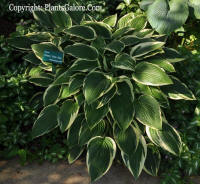Species or Cultivar? The names of plants have
evolved over the time that they have been known to mankind. A
science called taxonomy has also evolved methods of trying to make
sense of the inevitable confusion which has been multiplied since humans
began to consciously cross breed plants to form new types.
 Hostas have long been mired in
this name game confusion. A huge step toward bringing order to this
chaos occurred in 1991 with the publication of a monograph named,
The Genus
Hosta Giboshi Zoku by
Wolfram George Schmid. This
large, scholarly, yet familiar, book pulled together historical
facts, scientific and horticultural practice to give a sense of order
to Hostas.
Hostas have long been mired in
this name game confusion. A huge step toward bringing order to this
chaos occurred in 1991 with the publication of a monograph named,
The Genus
Hosta Giboshi Zoku by
Wolfram George Schmid. This
large, scholarly, yet familiar, book pulled together historical
facts, scientific and horticultural practice to give a sense of order
to Hostas.
Hosta is, of course,
the plant genus. Even this took a while to develop with the plants
being known as Funkia until fairly recently. The next level
down, the species, was the area where Schmid had the most impact.
The term "species" seems to
have a lot of different meanings in the biological world.
However, a simple definition might be that a species includes plants
(or animals) that exist and reproduce in the wild or that there is some type of
record or proof that they once existed in the wild. This would
include evidence such as herbarium samples, fossils or other
findings.
 Schmid came to the conclusion
that a number of hostas that were previously thought to be species did not meet
this definition. These plants were "created" under cultivation by
humans with no evidence that they every occurred in the wilds. So, he "demoted" them to cultivar status. Instead
of having a name written in italics such as Hosta
fortunei
which would indicate a species status, they are now properly
written as Hosta 'Fortunei' the same as any other cultivar
such as H. 'Sum and
Substance'.
Schmid came to the conclusion
that a number of hostas that were previously thought to be species did not meet
this definition. These plants were "created" under cultivation by
humans with no evidence that they every occurred in the wilds. So, he "demoted" them to cultivar status. Instead
of having a name written in italics such as Hosta
fortunei
which would indicate a species status, they are now properly
written as Hosta 'Fortunei' the same as any other cultivar
such as H. 'Sum and
Substance'.
There are several
groups of hostas which have had their cultivar names altered due
to this change. For instance, plants formerly known as H.
fortunei 'Hyacinthina' are now correctly called H. 'Fortunei
Hyacinthina'.



